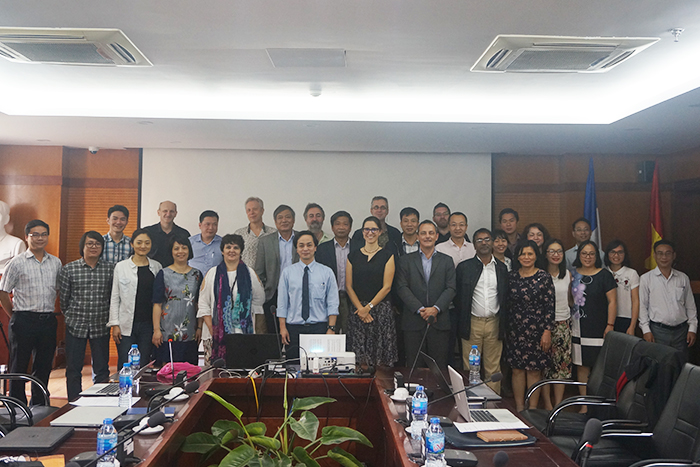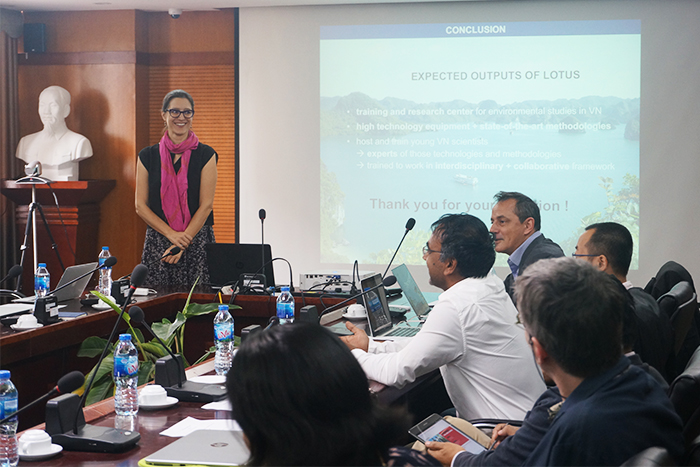On March 28th, 2018, the University of Science and Technology of Hanoi – USTH (also called Vietnam France University) hosted a conference to introduce the project to establish the International Joint Lab Study Center of the Land-Ocean-aTmosphere regional coUpled System (LOTUS)
LOTUS has two main founders which are USTH and Laboratory of studies on Spatial Geophysics and Oceanography (LEGOS) under the French Institute for Development (IRD).The project has received strong support in both of finance and professional issues from many universities, institutes, and organizations of Vietnam and France in the field of environment, ocean, and remote sensing.
There are many prestigious scientists in the project such as Prof. Alexis Drogoul, representative of IRD in Vietnam; Assoc. Prof. Vo Si Tuan, Vice- Director of Institute of Oceanography (IO); Dr. Tran Dinh Lan, Director of Institute of Marine Environment and Resources (IMER); Dr. Pham Minh Tuan, Director of Vietnam Space Technology Institute (STI). From USTH, Assoc. Prof. Ngo Duc Thanh, Vice Rector of USTH, Co-Director of Space and Application Department, Co-Director of LOTUS; Dr. Marine Herrmann, Co-Director of Water – Environment – Ocean Department (WEO), Director of International Laboratory of Oceanography (HILO) at USTH, Co-Director of LOTUS project; Assoc. Prof. Nguyen Thi Hue, Co-Director of WEO.

The kick-off meeting attracts over 30 domestic and international scientists, and researchers to share their experiences, and expectation about LOTUS to strengthen current cooperation network of the project and seek for new cooperation opportunities.
LOTUS is aimed to develop an innovative integrated approach to study the transport and fate of water and associated matter in the atmosphere-continent-ocean coupled system in coastal regions of Vietnam and South East Asia (SEA). These data are really crucial to Vietnam because this is a coastal country where key agriculture, fishing and tourism industries strongly rely on water resources and quality.

As the co-founders of LOTUS, USTH has the responsibility of ocean and atmosphere modeling, water analyses, and LEGOS is in charge of hydro and oceanography modeling and observation.
For founding institutions of the project are IRD, Federal University of Toulouse Midi-Pyrénées, University of the Littoral Opal Coast in France, Vietnam Academy of Science and Technology (VAST).
LOTUS has had strong support from key French and Vietnamese members in many important issues. CNRS/UFTMIP assists Ocean Modeling SIROCCO tools. Meanwhile, CNRS/ ULCO contributes techniques in marine remote sensing and hydrodynamics. On the other hand, IO provides information and methods to collect database in coastal to regional oceanography. IMER participates in collecting information in coastal to regional oceanography. VAST takes part in researching estuarine and coastal systems. STI under VAST supplies techniques to build database via earth satellite observation.
In the meeting, the researchers presented a number of practical topics which they had thoroughly researched. Some highlights of their presentations were: researching on applying SMART GARDEN, an ecological engineering platform to improve wastewater quality from wastewater treatment plant of VAST; inventory and fate of pesticides in Red River from inland to seawater (PENROSE); Human impact on carbon transfer in the lower Red River; overview of atmospheric activities in the framework of the CORDEX-SEA group.
Established in an excellent model of the public university, USTH highly focuses on developing research activities on the international scale to help the students to quickly access to international science and technology. By the end of 2017, USTH had 9 international joint labs thanks to working closely with researchers and researching groups of over 40 leading institutes and universities under USTH Consortium. The two universities participating in the LOTUS project, including the Federal University of Toulouse Midi-Pyrénées and University of the Littoral Opal Coast are also in the USTH Consortium. LOTUS is considered as a key project of USTH to increase the total number of international joint labs at USTH to 10.

